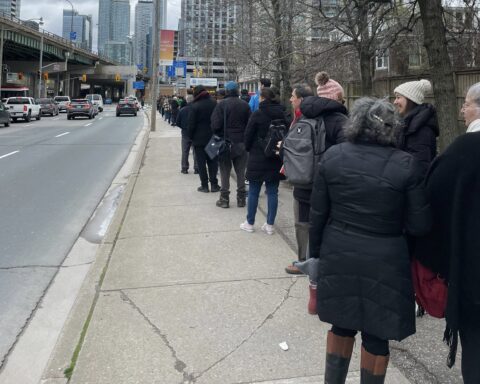![]() Canada’s youth vote is up for grabs. So who’s grabbing?
Canada’s youth vote is up for grabs. So who’s grabbing?
There’s a persistent myth about young voters — that they tend to act as a bloc and tend to favour left-centre or ‘progressive’ parties. Jeffery Simpson latched on to the myth last week in the Globe and Mail, arguing that the declining youth vote is “bad news for the Liberals and great news for the Conservatives.”
Young people who don’t vote in the first two elections after they become eligible are consequently less likely to vote throughout the rest of their lives.
In fact, declining youth voter turnout doesn’t favor one political party over another. Sure, current polls seem to give a slight advantage to the Liberals over the Conservatives in terms of young adults’ voting intentions. But in order to really understand this demographic and the opportunities it offers for parties, we need to take the longer view.
Youth Votes Often Lead To Lifetime Votes
Research tells us that partisan political identities take root in early adulthood. And as I’ve mentioned in previous articles, the habit of voting (or of not voting) is also formed in that critical 18 – 24 age range. Young people who don’t vote in the first two elections after they become eligible are consequently less likely to vote throughout the rest of their lives.
Convince a young person to vote for you in the first or second election of their voting career, in other words, and you may have a supporter for life. So you’d expect to see all the political parties scrambling to lock in young people in big numbers.
And here’s the key takeaway from the research — this cohort of young voters is up for grabs for any political party that decides to actively engage them. I grew up in rural Saskatchewan and the Yukon, so I know from experience that this image of young Canadians as left-leaning, university educated and urban is far from reality. Young people are people — they’re as diverse as any other segment as of the population and we do them a disservice when we label them.
Learning From Obama
When President Barack Obama’s campaign successfully courted the millennial generation in 2008, it did so with a sophisticated on-the-ground network of highly motivated volunteers who actively engaged younger voters face to face. The tactics he used and the resulting engagement of youth as Democratic voters in 2008 and again in 2012 could have been adopted by the Republicans just as easily. If you don’t believe me, ask Chuck Norris (yes, that Chuck Norris).
Parties that want a future in Canadian public life should be aggressively courting young voters right now.
Obama’s campaign was an anomaly when placed in the context of youth voting patterns. In the U.S., “for most of the past four decades there was little difference in the voting preferences of younger and older Americans”, a Pew Research Centre study concluded. Most political scientists agree that young people tend to follow the voting patterns of older generations. In fact, a well-respected Canadian youth engagement organization, Civix, has seen this very trend in the results of its Student Vote program — where results often mirror those of the ‘real’ election results. So young people tend to vote like their parents — unless aggressive voter mobilization efforts seek them out.
We make a mistake when we underestimate the political diversity of our young people. The youth vote isn’t a zero-sum game, where the gains all accrue to one end of the ideological spectrum. Parties that want a future in Canadian public life should be aggressively courting young voters right now — for their own sakes, and for the sake of our democracy’s ongoing good health.
Ilona Dougherty is co-founder of Apathy is Boring, a national non-partisan charitable organization that uses art and technology to educate youth about democracy and encourages them to vote. She is a regular commentator in national media, a published author, and speaks to audiences internationally about redefining intergenerational relationships and encouraging active citizenship.
Republished in partnership with iPolitics.ca





